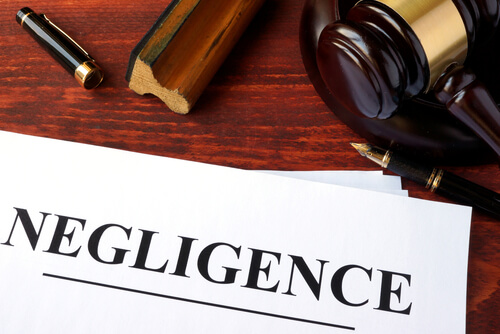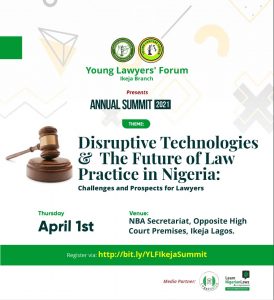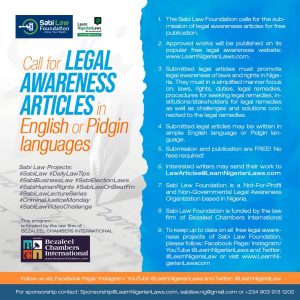What is Negligence in the Eyes of Law? Daily Law Tips (Tip 767) by Onyekachi Umah, Esq., LL.M, ACIArb(UK)
Introduction:
Words and terms may mean different things in different languages and disciplines. Where a person fails to be careful and his carelessness causes damage to another person, the careless person is negligent. Being negligent may lead to the payment of the cost of negligence. In law, it is common to find parties in court arguing over negligence, duty of care, breach of the duty of care, degree of negligence, damages caused by negligence and compensation for negligence. So, at the center of such cases sits the question; “What is Negligence in the eyes of law?”.
Negligence in law:
The judgments of the Supreme Court of Nigeria and the Court of Appeal have developed rich legal literature on and around “Negligence”. Hence, the judgements of the courts will be exclusively relied on here.
- In 2019, Justice Eko of the Supreme Court of Nigeria, stated in the case of ADESINA v. PEOPLE OF LAGOS STATE (2019) LPELR-46403(SC); “Negligence, according to the Oxford Advanced Learner’s Dictionary, is the failure to give enough care or attention. Negligence connotes lack of proper care and attention. It is a careless lack of proper conduct. In OGBIRI & ANOR v. NIGERIA AGIP OIL CO. LTD (2010) L.P.E.L.R.- 4586(CA), I stated, relying on ODINAKA v. MOGHALU (1992)4 N.W.L.R. (Pt. 233) 1 at 15; OJO v. GHARORO (2005) 18 L.R.C.N. 1652 at 1713 – 1713, that generally, negligence is an omission or failure to do something which a reasonable and prudent man, under similar circumstances, would not do. See also RABIU HAMZA v. PETER KURE (2010) 10 N.W.L.R. (Pt. 1203) 630 at 646 per Muhammad, JSC. Negligence is any conduct that falls below the legal standard established to protect others against unreasonable risk of harm. The term denotes culpable carelessness: Black’s Law Dictionary, page 1133 9th Ed.”Per EKO ,J.S.C ( P. 12, paras. B-F )
- Justice Saulawa of the Court of Appeal in the case of CHEVRON NIGERIA LIMITED & ANOR v. KEHINDE OMOREGHA & ORS (2015) LPELR-24516(CA), stated that; “The term negligence denotes the failure to exercise the standard of care that a reasonably prudent person would normally have exercised in a similar situation. That’s to say, any conduct falling below the legal standard established to protect others against unreasonable risk of harm, as against conduct that is intentionally, wantonly, or willfully disregardful of other’s rights. It is trite, that the negligence usually includes culpable carelessness. Also termed actionable negligence; ordinary negligence; simple negligence. See BLACK’S LAW DICTIONARY 9th Edition 2009 @ 1133. I think, it was Patrick Devlin, who once aptly remarked that -“Negligence in law ranges from inadvertence that is hardly more than accidental to sinful disregard of the safety of others.” See THE ENFORCEMENT OF MORALS (1968) @ 36 copiously alluded to in BLACK’S LAW DICTIONARY (Supra) @ 1133.” Per SAULAWA ,J.C.A (Pp. 14-15 paras. C).
-
- The Supreme Court of Nigeria in the case of DIAMOND BANK LIMITED V. PARTNERSHIP INVESTMENT COMPANY LIMITED & ANOR (2009) LPELR-939(SC), held that; “It is settled that negligence is a question of fact and not of law. So, each case must be decided in the light of the facts pleaded and proved. No one case is exactly like another. See the case of Alhaji Kalla v. Jarmakani Transport Ltd. (1961) ANLR 778 @ 785 referring to the English cases of Baker v. Longburst (E) & Sons Ltd. (1933) 2 KB. 461; 102 L.J. KB. 573; 149 L.T. 264; (1932) All E.R. Rep. 102 and Tart v. Chitty (G.W.) & Co. Ltd. (1933) 2 KB. 465; 102 L.J. K.B.568; 149 L.T. 261; (1931) All E.R. Rep. 826.”
-
-
- The Court of Appeal in the case of P.W. NIGERIA LIMITED v. MANSEL MOTORS LIMITED & ANOR (2017) LPELR-43390(CA), where the court held that; “A duty of care arises “whenever a person is by circumstances placed in such a position with regard to another that everyone of ordinary sense who did think would at once recognize that if he did not use ordinary care and skill in his own conduct with regard to those circumstances he would cause danger or injury to the person or property of the other, a duty arises to use ordinary care and skill to avoid such danger …”
-
-
-
- Again, in P.W. NIGERIA LIMITED v. MANSEL MOTORS LIMITED & ANOR (2017) LPELR-43390(CA), the appellate court held that, “Negligence is a tort and it is complete and actionable when three conditions are satisfied, these are (i) the defendant owed a duty of care to the claimant; (ii) the duty of care was breached; and (iii) the claimant suffered damages arising from the breach. A claimant must prove the three conditions by preponderance of evidence or on balance of probabilities to succeed in an action rooted in negligence and once these requirements are satisfied, the defendant in law will be held liable in negligence Abubakar Vs Joseph (2008) 13 NWLR (Pt 1104) 307, Iyere Vs Bendel Feeds and Flour Mills Ltd (2008) 18 NWLR (Pt 1119) 300, GKF Investment Nigeria Ltd Vs Nigerian Telecommunications Plc (2009) 15 NWLR (Pt 1164) 344 and Diamond Bank Plc Vs Partnership Investment Co Ltd supra.”
-
Conclusion:
Under the Nigerian law, my neighbour is the person or persons that may be affected by my lack of care. The care must be one expected of any person in a similar situation. For instance; (1) while enjoying basketball on the street, I should be careful enough to ensure that the ball does not hit a passerby. So, at that point, I owe a duty of care to all passersby. (2) While mounting a big sign board in a show room, I should be diligent enough to ensure that all screws are tightened to prevent the sign board from detaching and hitting guests on the show. So, I owe a duty of care to all persons within the area of the sign board to ensure that my negligence with the sign board does not harm them. (3) A manufacturer of toothpaste should be careful to ensure that no consumer uses a toothpaste with acid that damages the teeth. (4) An event organiser must be diligent to ensure that the stage for an event does not break and injure participants.
We are all our neighbours-keepers in law and our neighbour is anyone that may be affected by our carelessness. When we fail in our duty of care to our neighbour, we may be ordered by a Court of law to pay for such carelessness. So, in all our activities, we must always look out for our neighbours in law.
My authorities, are:
- Sections 1, 2, 3, 4, 5 and 6 of the Constitution of the Federal Republic of Nigeria, 1999.
- Judgment of the Supreme Court of Nigeria in the case of ADESINA v. PEOPLE OF LAGOS STATE (2019) LPELR-46403(SC);
- Judgement of the Supreme Court of Nigeria in the case of DIAMOND BANK LIMITED V. PARTNERSHIP INVESTMENT COMPANY LIMITED & ANOR (2009) LPELR-939(SC)
- The judgment of the Court of Appeal in the case of CHEVRON NIGERIA LIMITED & ANOR v. KEHINDE OMOREGHA & ORS (2015) LPELR-24516(CA)
- The judgment of the Court of Appeal in the case of P.W. NIGERIA LIMITED v. MANSEL MOTORS LIMITED & ANOR (2017) LPELR-43390(CA)
- Onyekachi Umah, “You are Responsible for the Safety of Your Guests, Invitees and Visitors” (LearnNigerianLaws.com, 6 June 2018) <https://sabilaw.org/daily-law-tips-by-onyekachi-umah-esq-tip-116-you-are-responsible-for-the-safety-of-your-guests-invitees-and-visitors/> accessed 30 Much 2021.
Sabi Law Projects:
#SabiLaw
#DailyLawTips
#SabiBusinessLaw
#SabiElectionLaws
#SabiHumanRights
#SabiLawOnTheBeatFm
#SabiLawLectureSeries
#CriminalJusticeMonday
#SabiLawVideoChallenge
Speak with the writer, ask questions or make inquiries on this topic or any other via onyekachi.umah@gmail.com, info@LearnNigerianLaws.com or +2348037665878 (whatsapp). To receive free Daily Law Tips, join our free WhatsApp group via https://chat.whatsapp.com/L7h4f1exItZ38FeuhXG4WN or Telegram group, via the below link: https://t.me/LearnNigerianLaws
To keep up to date on all free legal awareness projects of Sabi Law Foundation, follow us via
Facebook Page:@LearnNigerianLaws,
Instagram:@LearnNigerianLaws,
Twitter: @LearnNigeriaLaw,
YouTube: Learn Nigerian Laws,
WhatsApp Groups via (https://chat.whatsapp.com/L7h4f1exItZ38FeuhXG4WN),
Telegram Group: (https://t.me/LearnNigerianLaws),
Facebook group: (https://www.facebook.com/groups/129824937650907/?ref=share)
or visit our website: (www.LearnNigerianLaws.com)
Please share this publication for free till it gets to those that need it most. Save a Nigerian today! NOTE: Sharing, modifying or publishing this publication without giving credit to the author or Sabi Law Foundation is a criminal breach of copyright and will be prosecuted. This publication is the writer’s view not a legal advice and does not create any form of relationship. You may reach the writer for more information.
This publication is powered by www.LearnNigerianLaws.com {A Free Law Awareness Program of Sabi Law Foundation, supported by the law firm of Bezaleel Chambers International (BCI).} Sabi Law Foundation is a Not-For-Profit and Non-Governmental Legal Awareness Organization based in Nigeria. For sponsorship and partnership, contact: sponsorship@learnnigerianlaws.com, sabilaw.ng@gmail.com or +234 903 913 1200.
























































One Response